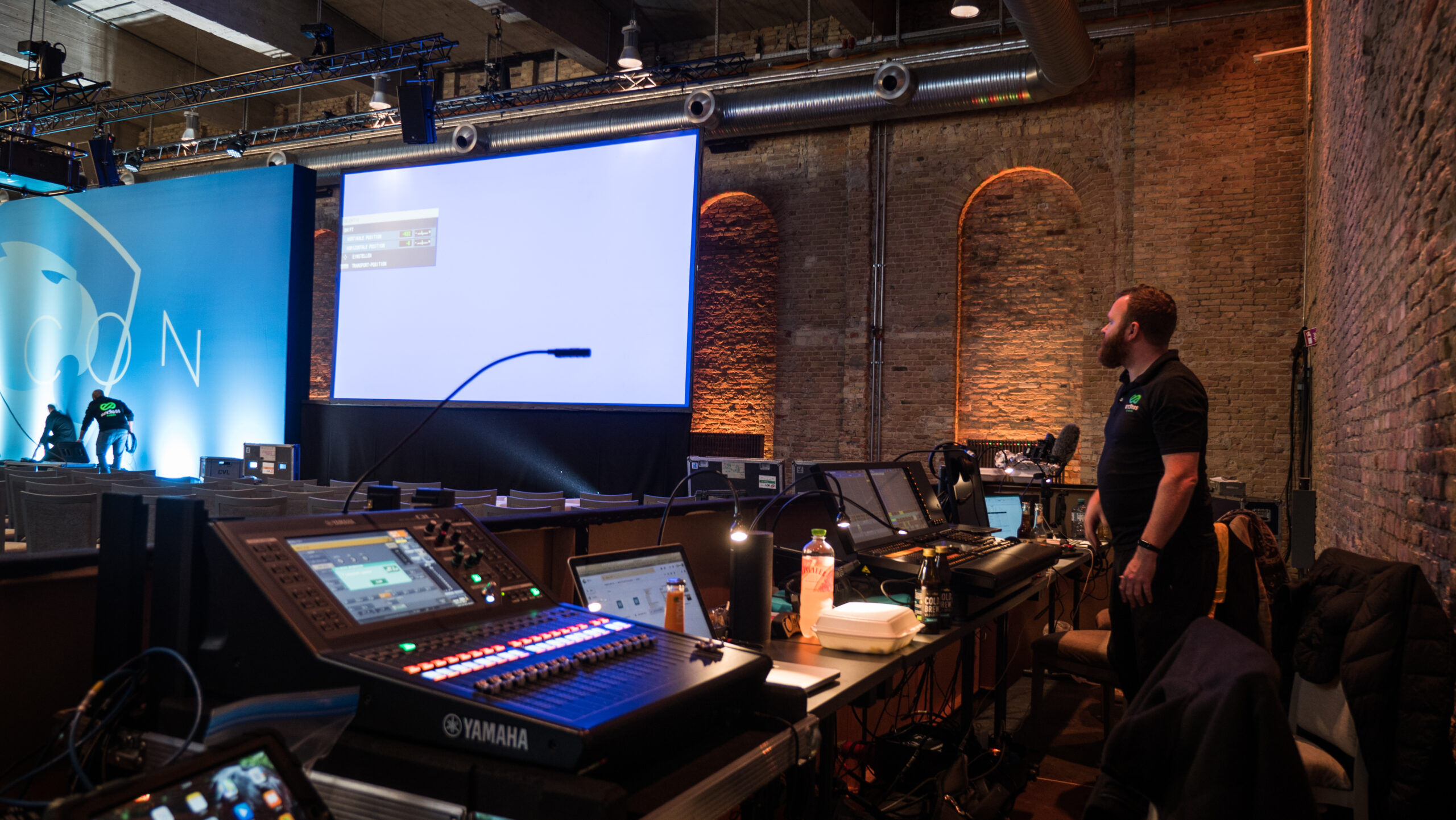Just How Event Production Functions: A Comprehensive Check Out the Process
Event production is a facility and structured process that needs cautious planning and implementation. It begins with developing clear purposes and comprehending the target audience. Each action, from budgeting to place choice, plays an important duty in making sure success. As the process unfolds, various components should align seamlessly. Yet, the subtleties of this elaborate operation frequently go unnoticed. What are the essential phases that add to a memorable event?

The First Drawing Board
When starting on event production, mindful planning is vital to ensure a successful end result. The initial planning stage functions as the structure for all succeeding efforts. Throughout this phase, event producers must specify the event's objective and purposes clearly. Recognizing the target market assists tailor the experience and messaging, assuring significance and engagement.Producers should also take into consideration the event style, whether it be in-person, virtual, or hybrid, as this will influence various logistical elements. Choosing an ideal date and place is essential, as it influences access and availability.Furthermore, assembling a dependable team is basic for separating obligations and streamlining interaction. Establishing a timeline with milestones warranties all tasks are completed on time. This phase involves complete research study, consisting of determining potential difficulties and devising approaches to minimize dangers. Ultimately, a well-structured initial preparation phase establishes the tone for a successful event production journey.

Budgeting and Resource Appropriation
In event production, efficient budgeting and source allowance are essential for success - event production charlotte. Developing economic specifications sets the foundation for all subsequent choices, while source distribution techniques guarantee that every element of the event is appropriately sustained. With each other, these elements aid keep control over expenditures and enhance the use of available resources
Developing Financial Parameters
Developing financial criteria is vital to the success of any type of event production, as it establishes the structure for efficient budgeting and resource allocation. This procedure starts with defining the general budget, which incorporates all facets of the event, consisting of venue costs, catering, and marketing. By identifying offered funds, event organizers can focus on expenditures and designate resources accordingly. In addition, it is necessary to carry out detailed market research study to anticipate possible costs and recognize funding resources, such as sponsorships or ticket sales. Developing clear monetary specifications additionally aids in danger management, allowing organizers to establish aside contingency funds for unexpected costs. Inevitably, a well-defined budget offers as a roadmap, guiding the event production team towards attaining their objectives while keeping financial control.
Source Circulation Methods
Efficient resource circulation approaches are important for optimizing the impact of an occasion while sticking to budget restrictions. Effective event production needs a thorough strategy to budgeting and resource allocation. Planners must focus on important aspects such as location, wedding catering, and modern technology, making sure that funds are alloted to areas that boost attendee experience. A comprehensive budget plan needs to describe anticipated expenditures and recognize areas for prospective cost financial savings, such as discussing with vendors or exploring sponsorship chances. Additionally, tracking expenditures throughout the preparation procedure assists prevent overspending. By employing strategic resource distribution, event producers can supply an unforgettable experience while keeping fiscal duty, inevitably adding to the general success of the event.
Place Selection and Logistics
Picking the best location is necessary to the success of any kind of event, as it establishes the phase for the general experience. Venue choice includes reviewing different elements, consisting of ability, ease of access, and location. Planners should take into consideration the target market and the nature of the event, ensuring the location lines up with the event's goals.Logistics play a considerable function in this procedure, involving arrangements for seats, audiovisual tools, and providing solutions. A well-chosen place should facilitate smooth flow for participants and staff, boosting engagement.Additionally, reviewing prospective locations for features like car park, restrooms, and emergency leaves is essential for security and benefit. The timeline for safeguarding the location is likewise essential, as preferred areas may schedule promptly - event production charlotte. Subsequently, detailed planning and prompt execution can eventually contribute to a smooth event experience, making venue selection and logistics essential parts of successful event production
Creative Principle Advancement
While the venue establishes the physical phase, imaginative concept advancement forms the event's identity and narrative. This procedure starts with determining the event's objective and target market, enabling event producers to create an engaging style that reverberates with guests. Brainstorming sessions typically include varied viewpoints, promoting cutting-edge concepts that align with the event's goals.Once a theme is developed, aesthetic aspects such as color schemes, signs, and decor are made to enhance the overall environment. Narration strategies might likewise be incorporated to develop an interesting trip for individuals, ensuring a remarkable experience. In addition, factors to consider relating to enjoyment, tasks, and interactive parts are straightened with the picked concept, reinforcing the style throughout the event.Ultimately, efficient creative concept growth assurances that every facet of the event functions cohesively, leaving a lasting perception on participants and satisfying the event's goals. This fundamental work prepares for succeeding planning and implementation stages.
Collaborating With Vendors and Providers
Effective event production depends upon effective cooperation with suppliers and providers. Picking trustworthy partners, negotiating contracts properly, and guaranteeing prompt shipments are critical action in this procedure. Each of these factors contributes greatly to the general success and smooth implementation of an event.
Picking Reliable Partners
Just how can event planners guarantee a seamless production experience? Choosing trusted partners is necessary in achieving this goal. Event coordinators have to perform complete study to identify suppliers and providers with a proven track record of excellence. This includes inspecting references, examining profiles, and examining consumer responses. Organizers ought to prioritize partners who demonstrate professionalism and trust, timely interaction, and a readiness to team up. Structure strong connections cultivates trust fund and makes it possible for quick analytic during the event. Additionally, it is advantageous to pick regional vendors that recognize the location and local logistics. Eventually, an effective event rests on the harmony between planners and their companions, guaranteeing that every element of production runs smoothly and effectively.
Negotiating Agreements Efficiently
Effective arrangement here of agreements is a vital step in the collaboration helpful hints in between event organizers and their suppliers and vendors. This process includes clear interaction of expectations, deliverables, and timelines. Organizers should carry out comprehensive study on market rates and market standards to develop a standard for arrangements. It is essential to produce a joint environment, urging open discussion concerning terms, prices, and prospective contingencies. Coordinators need to also focus on understanding the supplier's abilities and constraints to straighten their demands efficiently. Adaptability can lead to equally beneficial agreements, cultivating lasting connections. Crafting well-defined contracts that consist of details efficiency metrics can aid guarantee liability, ultimately leading to effective event implementation and satisfaction for all events involved.
Guaranteeing Prompt Distributions
Timely distributions are essential for the smooth implementation of any type of event, requiring thorough collaboration between coordinators and their vendors and distributors. Efficient communication is crucial, as it aids establish clear expectations concerning delivery schedules, amounts, and particular requirements. Planners frequently produce thorough timelines to describe crucial turning points, ensuring all celebrations remain lined up throughout the procedure. Routine check-ins with vendors can help determine prospective delays early, allowing for aggressive solutions. Additionally, building strong connections with reputable distributors cultivates trust and accountability, which can lead to much better service and prioritization. By prioritizing these collective efforts, planners can minimize disruptions, therefore boosting the general performance of event production and guaranteeing that all required materials and solutions get here as intended.
Marketing and Promotion Methods
While organizing an occasion, the success of advertising and marketing and promo strategies can significantly influence participation and interaction. Effective strategies usually include a mix of electronic advertising, typical advertising, and grassroots outreach. Utilizing social networks systems enables real-time interaction and targeted marketing, reaching details demographics successfully. Email marketing campaigns can additionally involve possible attendees you could check here with individualized web content and reminders.Collaborations with influencers or sector leaders can additionally improve integrity and broaden reach. Creating engaging content, such as video clips or blog sites, assists to produce buzz and endure passion leading up to the event. In addition, leveraging early-bird price cuts and unique rewards can incentivize ticket purchases.Promoting with traditional networks, such as posters or neighborhood media, continues to be relevant, specifically in community-focused occasions. A comprehensive technique that incorporates multiple methods warranties optimum exposure and engagement, ultimately adding to the event's success and the development of a remarkable experience for participants.
On-Site Implementation and Monitoring
On-site execution and monitoring are essential components that establish the total success of an event. Efficient sychronisation during the event assures that all aspects straighten with the prepared agenda. Event managers look after logistics, including supplier control, tools configuration, and visitor services. Keeping track of timelines and resolving any kind of unanticipated issues are essential for keeping a seamless experience.The staff plays a substantial role, as skilled workers are in charge of different jobs such as enrollment, info circulation, and technical assistance. Interaction amongst group members is crucial; it cultivates a collective atmosphere and allows quick resolution of challenges.Additionally, safety and security protocols should be followed, protecting the wellness of all guests. Post-event evaluations are also component of on-site administration, providing understandings for future renovations. By focusing on these facets, event manufacturers can produce memorable experiences that fulfill or surpass guest expectations while accomplishing the event's goals.
Often Asked Questions
Just how Do I Pick the Right Event Theme?
Choosing the ideal event theme entails thinking about the target audience, event purpose, and place. Investigating current patterns and gathering input from stakeholders can additionally influence imaginative ideas that reverberate and develop an unforgettable experience.

What Are Typical Blunders in Event Production?
Common errors in event production frequently consist of inadequate preparation, poor interaction amongst employee, budget plan mismanagement, neglecting to think about the audience's requirements, and falling short to perform a detailed post-event assessment for future enhancements.
Exactly How Can I Gauge Event Success?
To gauge event success, one can evaluate guest contentment, engagement degrees, spending plan adherence, and post-event feedback. Key performance indicators, such as ticket sales and social networks interactions, likewise supply important insights into overall performance.
What Should I Do if It Drizzles on the Event Day?
In the event of moisten the day, the organizer ought to implement backup plans, such as securing camping tents or moving tasks inside. Communication with participants about adjustments is important to assure a smooth experience regardless of weather challenges.
How Can I Make Certain Guest Interaction Throughout the Event?
